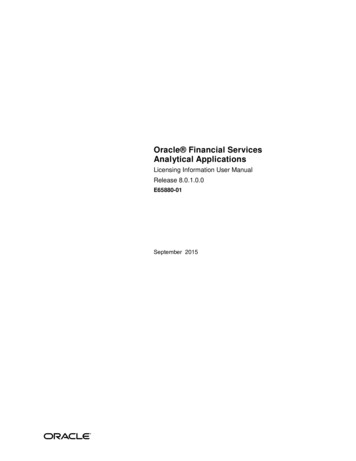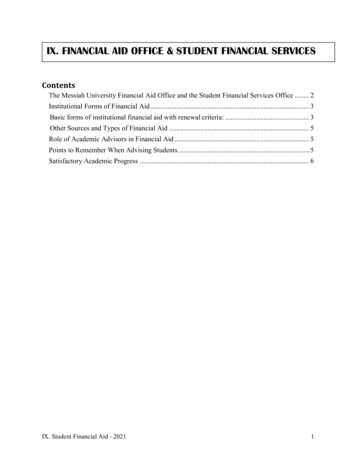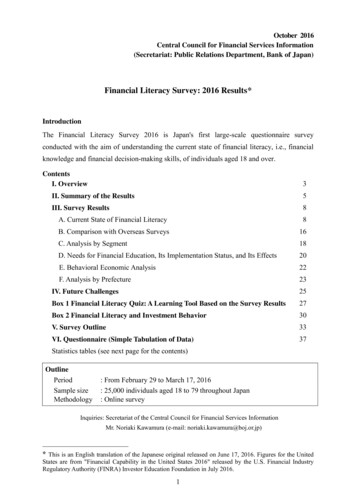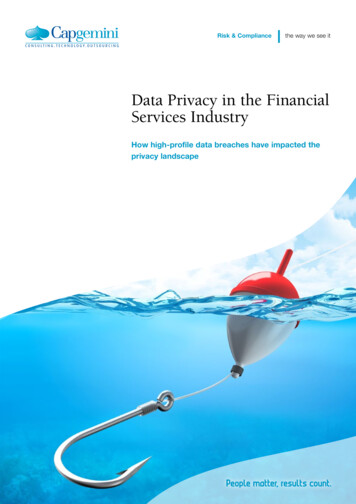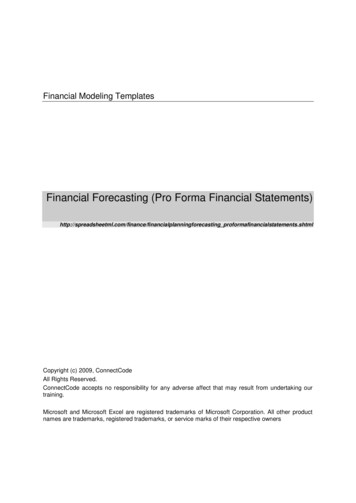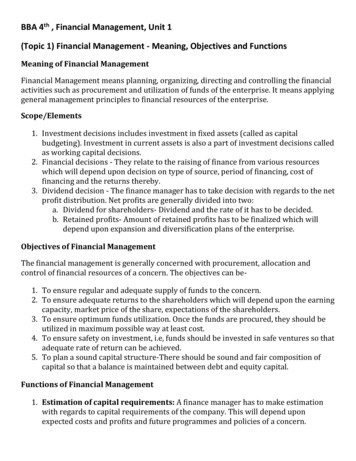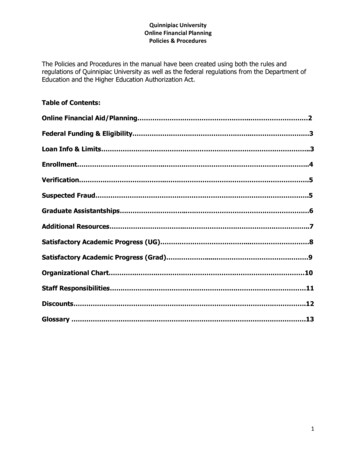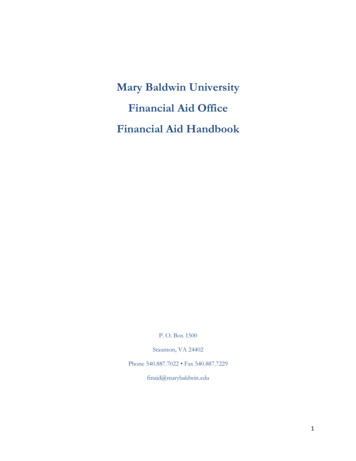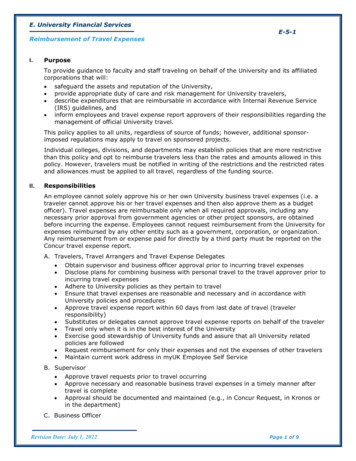
Transcription
E. University Financial ServicesReimbursement of Travel ExpensesI.E-5-1PurposeTo provide guidance to faculty and staff traveling on behalf of the University and its affiliatedcorporations that will: safeguard the assets and reputation of the University,provide appropriate duty of care and risk management for University travelers,describe expenditures that are reimbursable in accordance with Internal Revenue Service(IRS) guidelines, andinform employees and travel expense report approvers of their responsibilities regarding themanagement of official University travel.This policy applies to all units, regardless of source of funds; however, additional sponsorimposed regulations may apply to travel on sponsored projects.Individual colleges, divisions, and departments may establish policies that are more restrictivethan this policy and opt to reimburse travelers less than the rates and amounts allowed in thispolicy. However, travelers must be notified in writing of the restrictions and the restricted ratesand allowances must be applied to all travel, regardless of the funding source.II.ResponsibilitiesAn employee cannot solely approve his or her own University business travel expenses (i.e. atraveler cannot approve his or her travel expenses and then also approve them as a budgetofficer). Travel expenses are reimbursable only when all required approvals, including anynecessary prior approval from government agencies or other project sponsors, are obtainedbefore incurring the expense. Employees cannot request reimbursement from the University forexpenses reimbursed by any other entity such as a government, corporation, or organization.Any reimbursement from or expense paid for directly by a third party must be reported on theConcur travel expense report.A. Travelers, Travel Arrangers and Travel Expense Delegates Obtain supervisor and business officer approval prior to incurring travel expensesDisclose plans for combining business with personal travel to the travel approver prior toincurring travel expensesAdhere to University policies as they pertain to travelEnsure that travel expenses are reasonable and necessary and in accordance withUniversity policies and proceduresApprove travel expense report within 60 days from last date of travel (travelerresponsibility)Substitutes or delegates cannot approve travel expense reports on behalf of the travelerTravel only when it is in the best interest of the UniversityExercise good stewardship of University funds and assure that all University relatedpolicies are followedRequest reimbursement for only their expenses and not the expenses of other travelersMaintain current work address in myUK Employee Self ServiceB. Supervisor Approve travel requests prior to travel occurringApprove necessary and reasonable business travel expenses in a timely manner aftertravel is completeApproval should be documented and maintained (e.g., in Concur Request, in Kronos orin the department)C. Business OfficerRevision Date: July 1, 2022Page 1 of 9
E. University Financial ServicesReimbursement of Travel Expenses E-5-1Approve travel request funding prior to travel occurringApprove necessary and reasonable business travel expenses and expense report fundingin a timely manner after travel is completeD. Accounts Payable Services Audits and approves all travel expense reports for adherence to policies and proceduresE. Travel Services III.Acts as liaison between the University and designated travel vendorsProvides risk management tools for traveler duty of careProvides historical airfare cost comparisons per policyMonitors adherence to policies and proceduresSee Travel Services website for full details of services providedDefinitionsA. CONUS: An acronym used by the U.S. government for the contiguous “continental UnitedStates”. The CONUS table is used to obtain per diem meal reimbursement rates for anarea.B. Fly America Act: A federal regulation that requires the use of U.S. flag carriers for travel onfederally funded sponsored projects. See Travel Services website for details.C. Incidentals: Expenses for laundry, baggage tips, housekeeping tips, and other lodgingrelated tips.D. Motor Vehicle Record (MVR) Release and Information Form: A form used by RiskManagement to verify driving records of employees traveling on behalf of the institution.This form must be on file with Risk Management before driving a motor vehicle (personal,rental or University owned/leased) on University business and should be updated wheninformation changes.E. OCONUS: An acronym used by the U.S. Government for areas “outside continental UnitedStates” including Alaska, Hawaii, U.S. territories as defined by IRS publication 570, andforeign countries. The OCONUS table is used to obtain per diem meal reimbursement ratesfor these localities and maximum lodging rates for areas other than the 50 United States.F. Per Diem Allowance: The fixed amount paid for subsistence and incidentals in lieu of actualexpenditures.G. Receipt: The acknowledgement of payment received. Receipts must include the name andlocation of the establishment, an itemized listing of the goods or services provided, thedate of the transaction and the amount paid. For airline tickets, the receipt must show theticket number (13 or more digits), issue/purchase date, issuing travel vendor, detaileditinerary with dates/flight times/destinations, purchase price including service fee, andform of payment.H. Reasonable expense: An expense that is ordinary and reflects a prudent decision to incurthe expense on behalf of University business. Reasonable expenses are not excessive inusual and ordinary circumstances.I.Residence: The permanent home address of the employee contained in the official recordsof the University Human Resources system.J. Subsistence: The amount expended for meals, including tax and tips, while traveling onofficial University business, but excluding meals included in registration fees.K. Type of Trip: The field on the Concur Travel Expense Report primarily used for determiningappropriate general ledger codes when completing a Concur Travel Expense Report.Revision Date: July 1, 2022Page 2 of 9
E. University Financial ServicesReimbursement of Travel ExpensesE-5-11.Domestic: Travel within the 50 United States including the District of Columbia,Canada, and the U.S. territories as defined in IRS Publication 570.2.International: Travel to all other locations other than domestic locations listed above.L. Travel Vendor:1.UK Travel Vendor: AAA Corporate Travel Services, Avant Travel and Concur Travelonline booking tool.2.Alternate Travel Vendor: Any travel vendor other than a University travel vendor asdefined above (e.g., Delta.com, Expedia, Orbitz, Travelocity, and ABC TravelInternational).M. Work Address: The street address where the employee normally performs regularlyscheduled duties. The work address must be in the official records of the University HumanResources system. The official work address of field employees is established by thedepartment head, based solely on the best interest of the University. If an employee ispermanently re-assigned or is stationed at a new location for two or more months, the newlocation will become the employee’s work address. Remote/hybrid employees may berequired to make trips to the central work address for meetings, special projects, trainings,equipment repair, etc. Employees will not be reimbursed for associated travel expenses forthese trips from any funds.IV.PolicyA. Necessary and Reasonable Travel ExpensesTravel expenses incurred must be necessary and reasonable to accomplish the traveler’sUniversity business travel needs.Travelers must use the most direct routes, incur the lowest reasonable travel expenses, andexercise care to avoid impropriety and/or the appearance of impropriety. Expenses relatedto personal travel or personal entertainment, including any additional baggage costs orother costs incurred related to items not needed to fulfill the business purpose of the travel,shall not be considered a reasonable business-related expense. Only items needed toaccomplish the business purpose of the trip shall be paid or reimbursed by the University.Travel dates are based upon when University business starts and ends, the actual businesslocation (distance from work address), and transportation schedules.Travel reimbursement must be reduced by any amounts credited to the individual byairlines, hotels or other travel vendors. Airline tickets or other travel expenses acquired withairline frequent flyer or credit card points/awards are not reimbursable. Only out-of-pocketexpenses are reimbursed.B. All Sponsored ProjectsCosts incurred by travelers whose expenses, in part or in whole, are funded from asponsored award must document that the expenses are reasonable, allowable, allocable,necessary and consistent with University policies. Sponsors may further limit the amountsreimbursed based upon per diem rates established by reference in agreements or contracts(e.g., state agreements or sub-agreements). If the trip includes international travel, lodgingshould be less than or equal to the U.S. federal government OCONUS allowable per diemand the airfare must be in compliance with the Fly America Act in addition to therequirements of section IV. G. International Travel.When travel costs will be charged in whole or in part to a sponsored project, award termsand conditions take precedence unless University policy is more restrictive. Expenses areRevision Date: July 1, 2022Page 3 of 9
E. University Financial ServicesReimbursement of Travel ExpensesE-5-1considered reasonable if they are consistently reimbursed on all other funding sourcesduring the budget period incurred. If expenses are split among multiple sources of funds,document the allocation method used (usually a percentage) to distribute expenses to thesponsored project. Lack of available funds, as when a sponsored project budget has notbeen approved, is not an acceptable reason for non-compliance with the over 60-daytaxation rule (see section V. B. Submission of Travel Expense Report and Reimbursementbelow). If the budget and allowable posting period are closed, reimbursement must bemade from another fund source.C. Economical Transportation Required1. Commercial Air TravelEmployees traveling on University business must travel at the lowest available airfarethat meets the business needs of the traveler. When evaluating the lowest cost option,transportation to/from the departing airport must be considered in the cost.a. Domestic travelers are encouraged to make their commercial air travelarrangements through the University's designated travel vendors as defined on theTravel Services website. Should the traveler elect to make their travelarrangements outside of the UK Travel Services program, the University reservesthe right to limit the reimbursement to what would have been paid had UK TravelServices been used (see section V. C. Cost Comparisons section below).b. All international airline tickets for UK-endorsed travel must be purchased throughUK Travel Services’ designated travel vendors.The University reimburses coach class airfare for domestic and international flights.However, with supervisor approval, business class airfare will be reimbursed for eighthours or more of uninterrupted flight service. Reasonable ancillary fees including, butnot limited to, expenses for convenient or early boarding, extended legroom, seatlocation, baggage, in-flight meals, and Wi-Fi service are approved at the supervisor’sdiscretion.2. VehiclesAn employee driving for University business must have a Motor Vehicle Record (MVR)Release and Information Form on file with Risk Management. For all types of vehiclesdriven, necessary and reasonable vehicle-related expenses are allowed for parking,tolls, ferries, bridges and tunnels. Payment of traffic and parking tickets are theresponsibility of the traveler. Automobile expenses such as repairs, towing,rental/mileage for sightseeing or other personal travel will not be paid with anyUniversity funds. Remote/hybrid employees will not be reimbursed mileage, car rentalexpenses, parking or other vehicle-related expenses for driving to a Universityoffice/location for meetings, special projects, trainings, equipment repair, etc.a. Personal VehicleBased on the IRS Standard Business Mileage Rates, the University will reimburse62.5 cents per mile (as of July 2022) for University business travel by personalvehicle based on the actual driving distance by the most direct route (not more than105% of the mileage listed on Google Maps). Mileage is reimbursed from thetraveler’s work address to the destination, unless driving from the traveler’sresidence is closer.If a traveler chooses to drive more than 500 miles one way to the businessdestination, mileage reimbursement shall not exceed the equivalent commercialairfare expenses for the same trip (see section V. C. Cost Comparisons section).Revision Date: July 1, 2022Page 4 of 9
E. University Financial ServicesReimbursement of Travel ExpensesE-5-1Gasoline and automobile expenses such as repairs and towing shall not be paid withthe University procard or reimbursed when driving a personal vehicle.b. University-Owned/Leased VehiclesMileage for University-owned vehicles will not be reimbursed. The actual cost of fuelwill be paid by the University with a key fob issued by the College of Agriculture,Food and Environment’s fueling facility or a U.S. Bank Voyager Fleet card.c.Rental CarsThe University prefers that rental car reservations be made through UK TravelServices’ designated travel vendors to receive negotiated rental car discounts. Themost economical car feasible for University business travel must be rented. Mileagefor rental cars is not reimbursable.Reimbursement for personal vehicle mileage or rental cars utilized to reach the businessdestination 500 miles one way should not exceed the equivalent commercial airfare forthe same trip (see section V. C. Cost Comparisons section).Insurance on domestic rental vehicles is provided by the University’s Actual Cash ValueComprehensive and Collision coverage plan. Collision deductible waiver (CDW) or anyother additional insurance is not a reimbursable domestic travel expense.Comprehensive, collision, and liability insurance on vehicles rented outside the UnitedStates, including Canada and U.S. territories as defined in IRS Publication 570 is areimbursable expense.3. Railroads, Non-local Buses, Commercial VesselsRailroads, non-local buses, or commercial vessels may be utilized when they provide forthe lowest cost transportation option available for the trip to meet the business needsof the traveler.4. Charter AircraftCharter aircraft may be used, in rare and unusual circumstances, if it is determined tobe advantageous to the University, measured by travel costs and travel time. Writtenjustification prior to travel must be submitted and approved by the department head orwhomever they have delegated authority to approve and Risk Management.5. Ground TransportationPersonal vehicle mileage will be reimbursed to the traveler’s departing airport. Otherforms of ground transportation to/from the departing airport (e.g., taxis or ride-sharingservices) can be approved by the supervisor in lieu of personal vehicle mileage.For ground transportation at the destination, expenses for buses, subways, taxis, andride-sharing services (e.g., Uber or Lyft) are reimbursable with supervisor approval.D. Meals and IncidentalsMeals and incidental expenses for domestic and foreign travel are paid using per diem ratesestablished by the U.S. federal government (CONUS or OCONUS), based upon the traveler’sdestination for that date. These expenses shall not be paid with the University procard. TheUniversity will reimburse meals and incidental expenses incurred on the first and last daysof travel at 75% of the standard per diem rate regardless of what time of day the travelbegins or ends.Meal per diem cannot be claimed for meals included in registration fees or otherwiseprovided at no cost to the traveler as part of the event. A traveler attending a function suchRevision Date: July 1, 2022Page 5 of 9
E. University Financial ServicesReimbursement of Travel ExpensesE-5-1as a luncheon or dinner meeting/event may be reimbursed for the actual meal cost insteadof the per diem when the traveler’s attendance is required.Laundry expense, baggage tips, housekeeping tips, and other lodging-related tips areconsidered incidental and are covered by the per diem rate and, therefore, are notreimbursable.E.LodgingUniversity business travelers must use lodging accommodations that are necessary andreasonable. The University is sales tax exempt for Kentucky hotels, and some out-of-statehotels as well. See Purchasing’s tax-exempt information for Kentucky and other applicablestates.Hotel late checkout charges or “no show” charges for guaranteed reservations that are notcancelled will not be paid or reimbursed by the University unless justified.F. Local TravelLocal travel is defined as less than 50 miles one way from the employee’s work address orthe traveler's residence, whichever is greater. Barring exceptional business reasons, localtravel does not qualify for an overnight stay or payment of personal meals. Based on theIRS guidance, if a trip exceeds the local travel distance and the traveler is in travel statusfor more than 12 hours, but the traveler chooses not to stay overnight, personal meals willbe eligible for reimbursement at 75% of the standard per diem rate for the locality visitedduring the day.G. International TravelAll international airline tickets for UK-endorsed travel must be purchased through UK TravelServices. International travel and travel to U.S. territories must be registered in theUniversity’s International Travel Registry before departure. Activities overseas that must beregistered include, but are not limited to, official University business, conferenceattendance/presentations, research, community service, and sabbaticals. To ensurecoverage under UK’s international insurance plan, all University travel outside of the UnitedStates and to the U.S. territories as defined in IRS Publication 570 must be registered.While Canada is considered domestic travel with regard to reimbursement, the tripclassification is still international for this registry.The following guidelines around international travel are aligned with CDC guidance: Effective June 14, 2021, fully vaccinated employees may conduct UK-endorsedinternational travel to any country that the CDC has designated a risk level 3 or lower forCOVID-19 without completing an additional review process. All UK-endorsed travel to these countries must be registered in theUniversity’s international travel registry. Fully vaccinated employees who wish to travel to a country designated as a risk level 4 bythe CDC must complete an additional review/approval process, initiated by sending anemail request to the University’s Director of International Health, Safety and Security. Employees who are not fully vaccinated must also complete an additional review/approvalprocess, initiated by sending an email request to the University’s Director of InternationalHealth, Safety and Security before traveling to any international destination, regardless ofrisk level. All international airline tickets for UK-endorsed travel must be purchased through UKTravel Services.Revision Date: July 1, 2022Page 6 of 9
E. University Financial ServicesReimbursement of Travel ExpensesE-5-1 International travel requests by students, including graduate students, and EducationAbroad programs, will continue to be reviewed and approved on a case-by-case basis inalignment with UK Administrative Regulation 4:9.All international travelers should be aware that many countries continue to implementborder restrictions, quarantine periods and testing requirements. It is essential for travelersto understand the landscape in their destination country so that they are prepared for anylogistical challenges they may encounter.Any UK employee traveling internationally or to a U.S. territory with an undergraduate orgraduate student (regardless of the student’s concurrent employment status with theUniversity), a postdoctoral fellow, or a GME Resident must register with UK’s Office ofInternational Health, Safety & Security or UK Education Abroad & Exchanges beforedeparture and comply with all other requirements established by University AdministrativeRegulation 4:9.Fly America Act - Generally, if a University traveler is traveling on funds provided by thefederal government, a U.S. flag air carrier (an airline owned by an American company) mustbe flown, regardless of cost or convenience. However, there are times when a foreigncarrier can be used through airline code sharing, open skies agreements, or time restrictiveexceptions. See Fly America Act details on the Travel Services website.Certain expenses required for and unique to international travel are reimbursable. Suchexpenses include visas and immunizations for a traveler’s destination recommended by theCenters for Disease Control and Prevention (CDC). Students may be reimbursed charges forUK’s required travel medical insurance charged to their student accounts from theInternational Center if they are traveling in their capacity as a University employee.Reimbursable expenses incurred abroad must be submitted in US Dollars (USD) using theexchange rate(s) in effect at the time of travel: If US Dollars (USD) are exchanged for foreign currency, the exchange rate listed on thereceipt can be used to convert expenses for the trip. Attach the receipt to the expensereport as documentation. OANDA.com may be used as a resource to obtain historical foreign exchange rates. Thetraveler may use the average rate for the travel period or the daily rate. Print andattach the page to document the exchange rate used. The Concur Travel Expense Report can convert the foreign currency receipt to U.S.Dollars. If expenses are charged on a credit card, the credit card company converts theexpenses and that rate must be used if known at the time the travel expense report issubmitted.H. Travel Reimbursed from Multiple EntitiesIf a traveler is taking a trip reimbursable jointly by the University and another entity orentities, the University will reimburse for its share of the actual fare necessary for Universitybusiness and the traveler is responsible for seeking reimbursement for expenses payable byothers. Fares greater than coach fare (e.g., first class or business class) cannot be used asthe basis for prorating air travel costs. When an outside organization reimburses or providesmeals, the traveler may not claim per diem from the University for those meals. In no casemay the amount reimbursed for the trip from all sources exceed the total expensesincurred.I.Working MealsBreakfast, lunch or dinner meetings when groups of employees in travel status to conductRevision Date: July 1, 2022Page 7 of 9
E. University Financial ServicesReimbursement of Travel ExpensesE-5-1University business may be reimbursed for actual expenses in accordance with E-7-10Discretionary Expenditures. The reimbursement must list all employees participating in theworking meal as well as the business purpose for the meal. The meeting agenda needs tobe attached with the itemized receipt. Travelers may not claim per diem for working mealsthat have been reimbursed at actual cost.J. Sabbatical LeaveExpenses incurred during sabbatical leave are payable when they are incurred for necessaryand reasonable University business, comply with all University travel policies, and haveadvance written approval of the department Chair.K. President’s Spouse or Partner TravelThe President is often required to have extensive and unique contact with the public onbehalf of the University. When he/she is performing official duties in such areas asphilanthropy, alumni, and governmental relations, the University will pay the spouse’s orpartner’s travel expenses with discretionary funds if the following conditions are met: The spouse or partner attends and contributes to the official function. This includesevents where the spouses or partners of the University’s guests are expected to bepresent. The purpose of the travel and the expenses incurred are fully documented. The spouse’s or partner’s travel expenses will be included on the President’s travelexpense report.The payment of travel expenses for spouses or partners of other University employees isnot permitted unless prior approval for the travel and estimated expenses is granted by thePresident. Such payments must be paid from discretionary funds.V.ProceduresA. Procurement CardThe University has a Procurement Card Program to facilitate payment of travel-relatedexpenses (e.g., airfare, lodging, car rental, registration and other ground transportationrelated costs) for University business. Frequent travelers should obtain a Universityprocurement card (procard).The procard must be used to pay for University business travel expenses not covered by themeal per diem or the IRS Standard Business Mileage Rates, when possible.Generally, the following expenses shall always be placed on the procard: Airfare, baggage and other airline fees allowable under this policyLodging (excluding personal expenses such as room service, movies and mini bars)Car rentalsGround transportationRegistration feesReceipts, along with any required supporting documentation, must be submitted for allprocard expenses over 75 allocated on the Concur General Travel Policy Expense Report bythe 15th day of the following month.In the event an unallowable or non-reimbursable expense, such as an expense which iscovered by mileage or per diem reimbursements, is paid with the procard, the expense shallbe deducted from the traveler’s reimbursement. Should the amount charged on the procardexceed the amount to be reimbursed, then the amount will be deducted from theemployee’s paycheck. The Concur Quick Reference Guide provides guidance related toreporting personal purchases.Revision Date: July 1, 2022Page 8 of 9
E. University Financial ServicesReimbursement of Travel ExpensesE-5-1B. Submission of Travel Expense Report and ReimbursementThe University complies with IRS rules on accountable plans. Travel expenses not paid withthe procard such as mileage and per diem reimbursements for meals and incidentals shouldbe submitted by the 15th of the month following the month the travel concluded, with anyrequired cost comparisons (see section V. C. Cost Comparisons below for when a costcomparison is required). Absent exceptional circumstances, travel expense reports approvedby travelers more than 60 days from the last date of travel will be reported as taxablewages. Receipts must be submitted for any reimbursable expense, excluding mileage and perdiem reimbursements, not placed on the procard.Reimbursements will be paid by ACH deposit to the main bank shown on the employee’spayroll record after the final approval is received on the Concur Travel Expense Report.C. Cost Comparisons1. When a traveler chooses to drive a personal vehicle or a rental car over 500 miles oneway to the UK business destination, an airfare cost comparison and the Air versus AutoTravel Expense Form must be submitted with the travel expense report comparing theairfare cost for business-only travel and the auto travel related costs. The airfare costshould be run at least three weeks prior to the start of travel, or as soon as the need fortravel is known if inside of three weeks. Reimbursement of personal mileage or rentalcar/gasoline expenses will be limited to no more than the normal expenses that would beincurred with air travel. For full instructions, see Required Cost Comparisons on the TravelServices website.2. When a traveler chooses to combine business with personal travel on an airline ticket, anairfare cost comparison secured on the same day the ticket is issued for business-onlytravel and the actual ticket receipt must be submitted with the airline ticket on theprocard expense report or the travel expense report if the ticket was not purchased withthe procard. For full instructions, see Required Cost Comparisons on the Travel Serviceswebsite.a. The procard can be used to purchase a combined business and personal airline ticketonly if the resulting airfare is equal to or less than the cost comparison airfare for UKbusiness-only travel.b. A personal credit card must be used to purchase a combined business and personalairline ticket if the resulting airfare is higher than the cost comparison airfare for UKbusiness-only travel. After travel is complete, the traveler will be reimbursed the costcomparison airfare.D. Splitting Travel Costs between Sources of FundsIf travel expenses for a single trip are split, benefit multiple sponsored funds or benefit bothsponsored and non-sponsored funds, all expenses must be allocated on a reasonable basis.Examples of a reasonable basis include determining that certain sessions of an event benefita specific sponsored project and allocate the expenses by percentage of the whole expense tothe multiple sources of funds. If an appropriate allocation method is not used, full timeequivalent of the funds is an acceptable alternative.Revision Date: July 1, 2022Page 9 of 9
1. Domestic: Travel within the 50 United States including the District of Columbia, Canada, and the U.S. territories as defined in IRS Publication 570. 2. International: Travel to all other locations other than domestic locations listed above. L. Travel Vendor: 1. UK Travel Vendor: AAA Corporate Travel Services, Avant Travel and Concur Travel
